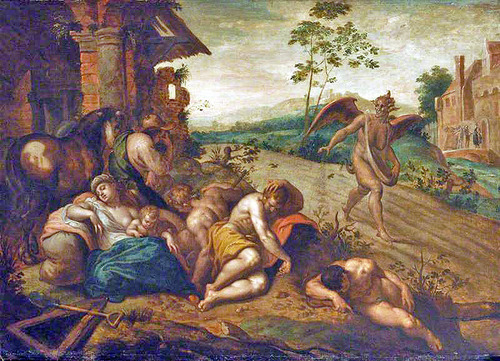- Why does God permit the evil to grow alongside the good? Why does God permit the presence of evil men in the Church? Which Bible passage(s) can you use to justify this reality?
The answer lies in the first reading from the book of Wisdom 12:13, 16–19, which tells us that God exercises leniency and clemency: “But though You are master of might, You judge with clemency, and with much lenience You govern us.” The emphasis on God’s forbearance underlies this reading. The God shown in this reading is so powerful and wise that He need not be vengeful and quick to punish. This God can afford to let His enemies live, for they can never prevail, and, given time, might repent.
Biblically speaking, in 2Pet. 3:9 we see God’s ‘sense of delay’ as a reflection of his leniency and clemency in seeing to the repentance of the wicked/evil man. Likewise, the Lord does not glory in the death of the wicked man, but in his repentance and salvation (cf. Ezekiel 18:23; 33:11). When James and John asked Jesus to call down from heaven fire to burn the Samaritans who reacted against them from passing through their town, Jesus told them it wasn’t necessary (cf. Luke 9:54ff). Later, in Acts chapter 8, we shall learn of the conversion of Samaria who later accepted the gospel.
- The First Reading is taken from the Book of Wisdom. When was it written, and by who? What does the author intend to teach us today?
The Book of Wisdom, written a century before Christ by a pious Jew in diaspora (in Alexandria) in the Greek language. Inasmuch as the book bears the sentiment of the wisdom literature of Solomon, but for the very reason that it was written in Greek (not in Hebrew), Solomon could not be said to be the author. This author must be a disciple of the school of thought of Solomon. Inasmuch as the author is generally unknown, many scholars have attributed it to Philo, a Jewish sage. The book was written a hundred years before the coming of Christ.
The book tends to show us a merciful and patient God, rather than the disciplining and punishing God presented in the book of Genesis.
- Notice that today’s parables come after the parable of the sower of last Sunday. Now, after the seeds fell into good soil in order to germinate, we can imagine how the “enemies” (who ate the seeds that fell on the path, prevented the seeds that fell on rocky grounds from taking roots, chocked the seeds that fell in thorn bushes) came and sowed weeds (darnels) among the good seeds while men were sleeping. What does this teach us?
This simply teaches us how relentless our adversary (the devil is) in luring us away from the path of salvation. 1Pet. 5:8 teaches us that we should be calm but vigilant because the devil is prowling around like a roaring lion looking for someone to eat. We have to stand up, strong in faith, so as not to allow the enemy to penetrate through our laxity or negligence (spiritual sleep) in sowing weeds (darnel) into our souls.
- The 2nd reading teaches us of the role of the Holy Spirit at prayers and that we are not alone while praying. Now, how do we relate prayerfully with the presence of evil men in the Church and society?
We are simply obliged to pray for them. The Holy Spirit can help us in this regard to discern the Will of God patiently in seeing to the conversion of the evil men/women, by “interceding for us with sighs too deep for words.”
Happy Sunday!
Shalom!
© Fr. Chinaka Justin Mbaeri, OSJ
Paroquia Nossa Senhora de Fatima, Vila Sabrina, São Paulo, Brazil
nozickcjoe@gmail.com / fadacjay@gmail.com


